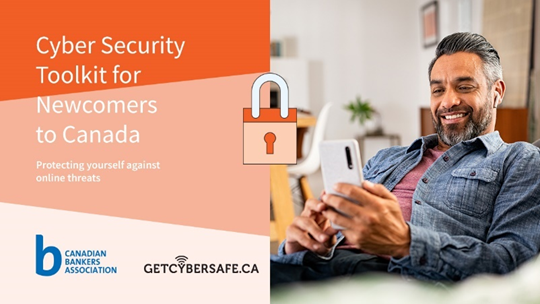
Moving to a new country can be exciting and overwhelming all at once. There are so many decisions to be made: where to live, what school to register the kids in, where to bank, and finding a family doctor. Budgeting for life in a new country is one challenge that a newcomer may need reliable and comprehensive information for, which is why we’ve partnered with Credit Canada on their program, Budgeting for Newcomers: Your Path to a Secure Financial Future.
Another thing that newcomers need to learn rapidly is how to develop efficient cyber hygiene so they can protect their personal and financial information, and ultimately, their hard-earned money.
In a new environment, still becoming familiar with banking practices and local laws, newcomers need to also be alert to not fall victim to frauds and scams. The CBA wants to make it easier to protect your personal and financial information by providing resources to help you to stay vigilant against scams.
Cybersecurity toolkit for newcomers
In our increasingly digital world, it’s important to develop strong cyber defences to ensure the safety of your information. Building this understanding is particularly vital, as newcomers may not be aware about common scams and therefore easier to target.
The Canadian Bankers Association’s free Cyber Security Toolkit for Newcomers to Canada, developed in collaboration with Get Cyber Safe, aims to educate newcomers on cyber best practices and empower them to recognize, prevent and/or avoid common scams.
The Toolkit provides tips and information on common scams including:
-
Phishing scams: tips on how to spot suspicious emails or texts
-
One-Time Passcode (OTP) scams: how fraudsters may attempt to deceive you into providing OTPs received by text or email
-
Phone scams: ways scammers attempt to trick you into providing financial information or money by impersonating government officials, banks or other organizations
-
Tax season scams: providing information on how the Canada Revenue Agency will contact you about your taxes owed or your tax refund
-
Job scams: how to spot fraudulent job offers
-
Identifying fake websites and apps: tips on how to identify fraudulent websites and apps that attempt to steal personal or financial information
-
Protecting against ransomware: steps to take to prevent and respond to ransomware attacks, including installing security software and backing up data
-
Choosing strong passwords: recommendations on how to develop unique and strong passwords to protect your most sensitive accounts
-
Reporting Fraud: how to report fraud and what to do if you suspect you are a victim of fraud
The CBA also has created additional fraud prevention toolkits. These resources are customized for individuals, small businesses and older adults, and offer actionable tips and useful checklists. They are all available for free and downloadable on our Fraud Prevention toolkit page.
Talking about fraud prevention with newcomers
Most of our day-to-day tasks are now done online, which in many ways has simplified our lives. Whether it’s paying bills, booking trips, filing taxes, sending money to family abroad, it is important to take caution when going about our business online. It’s also important to share that knowledge with those we care about.
Being able to identify the red flags of frauds and scams is great, but don’t stop there, share them with family and friends. Sharing that knowledge helps others make safer financial decisions that can lead to better financial outcomes.
This Financial Literacy Month (FLM), share tips and resources on how to keep your financial and personal information safe with a family member or friend who may be new to the country. Speaking about our experiences can truly benefit those who are starting to build their lives in Canada. Here are some tips on how to spark a conversation:
-
Assist older adult relatives or those who may not be cyber savvy to ensure that good cyber security protocols are in place. Be generous with your time to help set up strong unique passwords, secure their home wi-fi, and educate about the perils of accidently downloading malware.
-
Download and print a copy of the CBA’s Cyber Security Toolkit with a cyber hygiene checklist and tips on how to spot common scams
-
Assist new social media users on knowing how to protect their online identity and privacy.
Additional resources to help
Do you know any newcomer older Canadians? The CBA offers a free fraud prevention seminar for seniors as part of its Your Money Seniors financial literacy seminar program. The seminar is presented by a volunteer banker in your area who dedicates an hour to discuss the common scams and frauds currently affecting seniors, how to spot the red flags and where to get help if you fall victim. More information about Your Money Seniors can be found at cba.ca/seniors.
Many banks offer advice, checklists and links to additional resources tailored to newcomers’ needs. Check out the Banking for Newcomers to Canada page on the CBA website for links to bank initiatives that can help with the transition to Canada.
About the Canadian Bankers Association
The Canadian Bankers Association is the voice of more than 60 domestic and foreign banks that help drive Canada’s economic growth and prosperity. The CBA advocates for public policies that contribute to a sound, thriving banking system to ensure Canadians can succeed in their financial goals. www.cba.ca.

Frequently Asked Questions
Have a question? We are here to help.
What is a Debt Consolidation Program?
A Debt Consolidation Program (DCP) is an arrangement made between your creditors and a non-profit credit counselling agency. Working with a reputable, non-profit credit counselling agency means a certified Credit Counsellor will negotiate with your creditors on your behalf to drop the interest on your unsecured debts, while also rounding up all your unsecured debts into a single, lower monthly payment. In Canada’s provinces, such as Ontario, these debt payment programs lead to faster debt relief!
Can I enter a Debt Consolidation Program with bad credit?
Yes, you can sign up for a DCP even if you have bad credit. Your credit score will not impact your ability to get debt help through a DCP. Bad credit can, however, impact your ability to get a debt consolidation loan.
Do I have to give up my credit cards in a Debt Consolidation Program?
Will Debt Consolidation hurt my credit score?
Most people entering a DCP already have a low credit score. While a DCP could lower your credit score at first, in the long run, if you keep up with the program and make your monthly payments on time as agreed, your credit score will eventually improve.
Can you get out of a Debt Consolidation Program?
Anyone who signs up for a DCP must sign an agreement; however, it's completely voluntary and any time a client wants to leave the Program they can. Once a client has left the Program, they will have to deal with their creditors and collectors directly, and if their Counsellor negotiated interest relief and lower monthly payments, in most cases, these would no longer be an option for the client.






